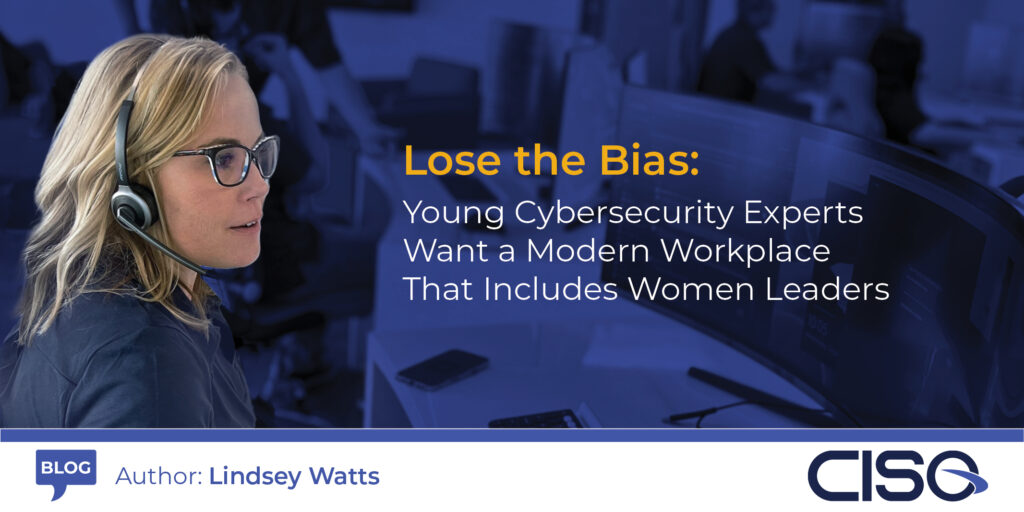Lose the Bias: Young Cybersecurity Experts Want a Modern Workplace That Includes Women Leaders
By Lindsey Watts, VP of Marketing, CISO Global, Inc.
2023 finds us in a sustained cybersecurity hiring crisis. With 3.4 million too few experts to meet global demand, it seems the widespread investments in university programs, increased certification access, and upskilling for existing IT professionals isn’t enough to bridge the gap. According to Cybersecurity Dive, we “aren’t keeping up with demand, and experts blame a lack of interest from young people entering the job market.” Companies who want to recruit young talent need to do a better job of showcasing work environments that reflect young people’s values. The question is, what kind of environment do they seek?

According to Fast Company, Gen Zers are “individualistic, socially aware, creative, stressed, diverse, and authentic – and by 2025, they will make up almost 30% of the global workforce.” So, if you want savvy up-and-coming cyber teams, it will be important to put leaders in place who “get” Gen Z values and will help create the environments they seek. That means less focus on corporate traditions and more focus on mindshare, with a willingness to embrace variety. Gen X and Millennial cybersecurity leaders who understand what it’s like to be an outsider are well poised to help create environments that are welcoming to all people who have the right skills for the job. Leaders like Kerry McQuarrie.
Tech Back in the Day
25 years ago, when Kerry McQuarrie started her career as an IT engineer, overcoming institutional bias didn’t mean facing obstacles due to visible tattoos, one’s religious beliefs, or cultural background. At that time, just being a woman was enough to shake things up. Still decades behind other fields, technology was significantly lacking in mindshare from less represented groups, such as women and minorities.
McQuarrie experienced direct and undeniable gender bias, especially early on, but in many ways, that’s what made her the leader she is today. Early in her first technology role, Kerry came to work one day to discover that none of her coworkers, all of whom were men, would speak to her. Confused as to the reason, she later came to learn that several people had openly postulated that she must have earned her new position unfairly, saying hateful things about her throughout the company.
Overcoming Setbacks
This was a significant blow on an emotional level, but as she says, “I got through it. Eventually my work ethic spoke for itself,” McQuarrie recalls. Overcoming bias and cruel rumors with consistently superior work, she ultimately won over her coworkers and began the path that would lead her to become a senior enterprise network engineer, an incident response and forensics team leader, and now manager of the Cerberus Security Operations Center. In this way, she broadened the team’s perspective, adding to it the lens of someone who approaches some problems differently than they would – resulting in a more balanced team of thinkers.
Diversity is Key in “Think Tank” Industries like Cybersecurity
Creativity is essential in an industry that seeks to solve some of the most complex problems the world faces today. Diversifying your thought leadership helps ensure you’re getting input from a variety of perspectives. As you build teams comprised of master-level experts, it’s important to attract those people from a variety of backgrounds. Research has shown that stacking teams with individuals who have diverse perspectives can, over time, help stimulate the cognitive processes needed to solve complex problems. In other words, you avoid “group think”.
What a Healthy Work Environment Looks Like
At Cerberus, company culture matters, and we’re creating a workplace young people will love. Not only do we support Millennial/Gen Z mainstays like remote work, but – as CEO David Jemmett often shares – we actually have a “no jerks rule” at Cerberus, supporting positivity, acceptance, respect, and human connection. Cerberus is building a preeminent team of top cybersecurity experts around the world who are focused on protecting clients from malicious attacks – together. Fighting cybercrime is a serious task, and we want all hands on deck.
A recent report predicts that by 2025, the estimated number of women in cybersecurity will grow to 30%. Through programs like Girls in Tech DC, consistent investments are being made into our future workforce, helping young women get exposure to and envision careers in technology – including cybersecurity. Cerberus leaders Ashley Devoto, Baan Alsinawi, Kerry McQuarrie, Jenna Waters, and others are cutting paths for young hopefuls to follow.
Kerry’s Advice to You
In thinking through what organizations can do to ensure they’re creating the right environment to support women in cybersecurity, Kerry McQuarrie notes that addressing more subtle biases can help. “Acknowledge the women in the room during technical discussions, and don’t call them cliché pet names like ‘sweety’ or ‘honey’.” These are the kinds of behaviors that may not be intended as hurtful but could make women on your teams feel dismissed as intellectual equals or even deter newcomers. On the other hand, improving your organization’s workplace interactions and putting more qualified nontraditional hires in visible leadership positions can help you attract (and keep!) up-and-coming cybersecurity experts.
Interested in a career with CISO Global? Check out our Careers page for our current openings.